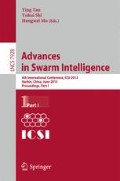Abstract
The diversity of population is an important indicator for measuring optimal performance of swarm intelligence algorithms. The effect of three operators of Shuffled Frog Leaping Algorithm (SFLA) on the diversity of population and the average optimization results were analyzed in this paper by means of the simulation experiments. The results show that removing the global extreme learning operator will not only maintain the higher diversity of population, but also improve the operating speed and the optimization precision of the algorithm.
Access this chapter
Tax calculation will be finalised at checkout
Purchases are for personal use only
Preview
Unable to display preview. Download preview PDF.
References
Chen, A.H., Dong, X.M., Dong, Z., et al.: Differential evolution algorithms based on improved population diversity. Electronics Optics & Control 19(7), 80–84 (2012) (in Chinese)
Luo, D.S., Liu, Y.M.: Adaptive PSO based on swarm diversity for VRPSPD. Computer Engineering & Science 34(7), 160–165 (2012) (in Chinese)
Sun, J., Fang, W., Xu, W.B.: A Quantum-Behaved Particle Swarm Optimization With Diversity-Guided Mutation for the Design of Two-Dimensional IIR Digital Filters. IEEE Transactions on Circuits and Systems. Part II: Express Briefs 57(2), 141–145 (2010)
Yuan, L., Yuan, W.W.: A kind of algorithm for the improved particle swarm optimization. Journal of Shenyang Ligong University 31(3), 15–18 (2012) (in Chinese)
Chen, C.Y., Chang, K.C., Ho, S.H.: Improved framework for particle swarm optimization: Swarm intelligence with diversity-guided random walking. Expert Systems with Applications 38, 12214–12220 (2011)
Yang, Y.S.: A particle swarm optimization algorithm with adaptive adjusting. Journal of Xi’an University of Science and Technology 31(3), 356–362 (2011) (in Chinese)
Min, L., Liu, Q., Zhu, J.S.: An improved hybrid particle swarm optimization algorithm based on disturbance. Wireless Communication Technology 2, 43–47 (2012) (in Chinese)
Peng, L., Zhang, L.M., Deng, X.Y.: Particle swarm optimization based on fuzzy control of population diversity. Computer Simulation 29(4), 255–258 (2012) (in Chinese)
Eusuff, M., Lansey, K.E.: Optimization of water distribution network design using the shuffled frog leaping algorithm. Water Resources Planning and Management 129(3), 210–225 (2003)
Riget, J., Vesterstrϕm, J.S.: A Diversity-Guided Particle Swarm Optimizer - The ARPSO. Technical report, Department of Computer Science, University of Aarhus (2002)
Author information
Authors and Affiliations
Editor information
Editors and Affiliations
Rights and permissions
Copyright information
© 2013 Springer-Verlag Berlin Heidelberg
About this paper
Cite this paper
Wang, L., Gong, Y. (2013). Diversity Analysis of Population in Shuffled Frog Leaping Algorithm. In: Tan, Y., Shi, Y., Mo, H. (eds) Advances in Swarm Intelligence. ICSI 2013. Lecture Notes in Computer Science, vol 7928. Springer, Berlin, Heidelberg. https://doi.org/10.1007/978-3-642-38703-6_3
Download citation
DOI: https://doi.org/10.1007/978-3-642-38703-6_3
Publisher Name: Springer, Berlin, Heidelberg
Print ISBN: 978-3-642-38702-9
Online ISBN: 978-3-642-38703-6
eBook Packages: Computer ScienceComputer Science (R0)

